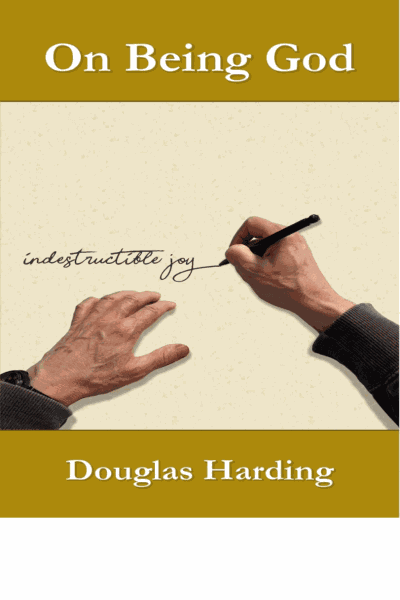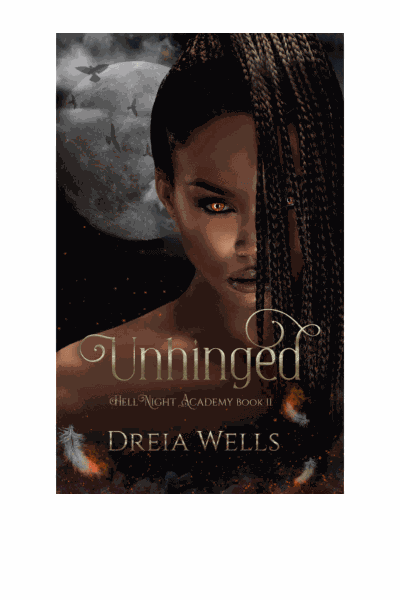
On Being God
Author/Uploaded by Douglas Harding
ON BEING GOD ON BEING GOD indestructible joy DOUGLAS HARDING The Shollond Trust London Published by The Shollond Trust 87B Cazenove Road, London N16 6BB, England www.headless.org [email protected] The Shollond Trust is a UK charitable trust, reg. no. 1059551 Copyright © The Shollond Trust 2023 All rights reserved. No portion of this book may be reproduced in any form or by any means withou...
Content Preview
ON BEING GOD ON BEING GOD indestructible joy DOUGLAS HARDING The Shollond Trust London Published by The Shollond Trust 87B Cazenove Road, London N16 6BB, England www.headless.org [email protected] The Shollond Trust is a UK charitable trust, reg. no. 1059551 Copyright © The Shollond Trust 2023 All rights reserved. No portion of this book may be reproduced in any form or by any means without written permission of the publisher. Cover design: rangsgraphics.com Interior design: Richard Lang Preface When Douglas Harding wrote The Face Game in 1968 he adapted the contents of On Being God, an unpublished work of about fifty short chapters he had written several years before. Harding did a superb job of morphing On Being God into The Face Game, a book that took Transactional Analysis to a new level, beyond psychology into Enlightenment. But happily, the original chapters of On Being God were still in Harding’s papers after he died, for they have a tone and message that is different from the form they took in The Face Game. On Being God stands on its own as a powerful, inspiring text. There are several influences, several spiritual traditions, detectable in On Being God. Harding’s greatest though not his best-known book, The Hierarchy of Heaven and Earth, was published in 1952. Everything that Harding later wrote in one way or another drew inspiration from that opus magnum. As he used to say, “It’s all in The Hierarchy”. However, in the late 1950s, some six years after finishing The Hierarchy, Harding discovered Zen through the writings of D.T. Suzuki and others. Harding’s best-known book On Having No Head connected headlessness with Zen and was published by the Buddhist Society in 1961. Just after On Having No Head Harding wrote Zen Experience, again connecting headlessness with Zen. The style of both these books is different from the more complex and philosophical Hierarchy. They are infused with the down-to-earth directness and simplicity of Zen, the discovery and expression of our ‘true nature’ in ordinary life. It was during this same period that Harding also wrote On Being God. However, this book is different. In it Harding mentions Zen only once. Instead the imagery and language, as the title indicates, is Christian, the faith of Harding’s childhood. After being out East (virtually, through reading Suzuki) Harding had returned to the West, as it were, and had shared his understanding of and enthusiasm for Zen — in On Having No Head and Zen Experience. But now, in On Being God, Harding put Zen aside and went back to his Christian roots. Even so, the essence of Zen pervades every page — its fearlessness, its brevity, its everydayness, even its humour. In the true spirit of Zen, Harding retained the spirit of Zen whilst dropping the form. Harding was both deeply knowledgeable of and proud of his Christian heritage. He was so familiar with the lives and writings of the great mediaeval European mystics, it was as if he knew them personally. Though in On Being God Harding doesn’t mention them by name, they are there in the background. Harding’s bold declaration that he is not seeing God as Harding but as God Himself is reminiscent of Meister Eckhart’s “the eye through which I see God is the same eye through which God sees me”, or Saint Catherine of Genoa’s “My Me is God, nor do I recognise any other Me but my God Himself”. These great mystics bravely proclaimed the reality of their divinity, thereby risking the charge of blasphemy. Harding felt close to them. But more than that, he saw he was one with them, consciously living from the same indivisible, infinitely creative Source. Of course, Harding was in no danger of being burned at the stake for saying he was God. Nevertheless he knew that he would upset the traditionalists. Though that didn’t matter to Harding. He relished being a rebel. On Being God has a mischievous, irreverent spirit running through it. (There again it is Zen-like.) Harding was aware he was barefacedly, no-facedly, challenging those around him who were attached to the form of their religion. Alongside Zen and Christianity is a third spiritual tradition present in the background of this book, another community of truth-sayers in whose company Harding felt at home. The Upanishads, the great scriptures of north India, were composed some three thousand years ago. Singing of the Alone — as the Alone — they use the language of the First Person. The Avadhut Gita declares: “I alone am, ever free from all taint. The world exists like a mirage within me. To whom shall I bow?” And the Kaivalya Upanishad proclaims: “I am in all, all are in Me.” In On Being God Harding, singing also as the Alone, also uses the language of the First Person — language in which from time to time he becomes ecstatic: “I laugh and shout My head off. This is what it is to be God Almighty — this roar of delight, this gasping incredulity, this trembling awe, this fathomless ignorance which is the highest knowledge. My God, how did I do It?” Harding is aware that his joy — astonishing fact! — does not belong to himself-as-Harding but to Himself-as-God. His joy is God’s very own joy at His own Being, the “indestructible joy” of having happened. You as God have carried off the ‘impossible but true’ feat of pulling yourself by your own bootstraps out of the deepest darkest night of non-being. The greatest magic trick ever! On Being God is a gita, a song of adoration and praise to the One, by the One — a modern Upanishad. However, more important than the religious traditions that Harding was inspired by was a principle Harding relied on whenever he responded to the question ‘What am I?’ (It is the principle at the heart of The Hierarchy of Heaven and Earth): I am the sole and final authority on what it is like to be me. Only I
More eBooks









